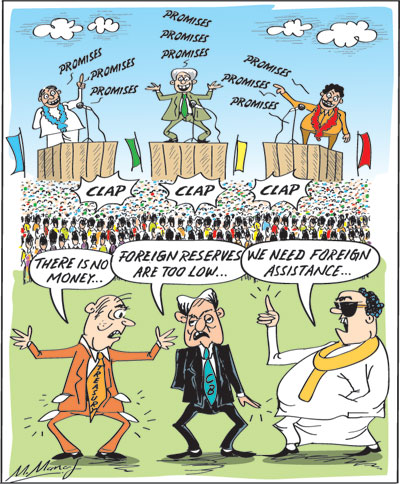The Economic Analysis
Election promises and economic reality
View(s):The extravagant election promises of many parties are inconsistent with the inadequate resources that are available. They do not reflect a recognition of the severity of economic problems facing the country nor the parlous state of finances. Election promises are an “auction of non-existent resources.” Resolving the severe economic problems facing the Government is a colossal challenge.
 Economic overview
Economic overview
Government revenue is dwindling, Government expenditure is rising, debt servicing costs are huge, the balance of payments deficit is widening, foreign reserves are declining, unemployment and poverty are increasing and key economic activities are in limbo. It is in this economic context that many candidates and recognised political parties are making extravagant promises that cannot be granted. The next Government has a huge task of stabilising the economy.
Three economic problems
Three serious problems that threaten the economy are difficult to resolve. They are the country’s external financial vulnerability, large fiscal deficit and low output of goods and services, high unemployment and increased poverty.
 External finances
External finances
The first, and arguably the most serious, is the perilous state of the country’s external finances. The servicing of the large foreign debt with a deteriorating balance of payments and dwindling reserves is an insurmountable problem without foreign assistance.
Fiscal deficit
The second serious problem is the burgeoning fiscal deficit that is a root cause for economic instability. While public expenditure is increasing, revenue is falling. The fiscal deficit is likely to reach double digit proportions this year and need to be halved in 2021.
Unemployment and poverty
Third is the decreasing output of goods and services leading to increasing unemployment, reduced incomes and rising poverty. Industrial output is declining, tourism is in abeyance and services related to tourism severely curtailed.
The reduced remittances from abroad are compounding the decreasing incomes due to increasing unemployment. These are difficult problems to resolve in the inhospitable global economy battling the COVID-19 pandemic. International assistance and global economic recovery are needed to resolve these problems.
Dismal economic performance
Sri Lanka’s trade and remittance dependent economy is in a dismal state. The Central Bank described last year’s economic performance as dismal. This year’s economic performance is likely to be much worse: More dismal than dismal.
The output of goods and services are likely to be less than that of last year, economic growth is likely to be negative and other critical economic indicators are deteriorating.
The balance of payments deficit is increasing, foreign reserves are dwindling, fiscal deficit is reaching double digit proportions, inflationary pressures are rising, unemployment and poverty are increasing and income distribution worsening with increased poverty.
Promises
Despite these onerous conditions, election promises abound with commitments that cannot be implemented. They do not recognise the limited resources of the Government and country or show an understanding of the fundamental macro-economic conditions. The scarcity of resources and the constraints and limitations of global conditions render an economic recovery difficult.
Hopes and expectations
Elections in Sri Lanka generate high hopes of economic prosperity and good times. However, irrespective of the election outcome, what lies ahead are hard times for the country. The reality is that the fundamentals of the economy are weak and global economic outlook is bleak and inhospitable.
Daunting task
In ten days time people will vote for a parliament and government. Whoever is elected to parliament, and whoever forms the government, will face a daunting task of stabilising the economy that is virtually in shambles.
Need
A stable government with an understanding of the severe economic plight and with a strong resolve to solve economic problems with pragmatic policies irrespective of their popularity is the need of the hour. Programs to stabilise the economy and generate incomes and employment will require austerity measures that will fall heavily on the people, especially those in the lower income and uncertain employment.
Farsightedness
Political courage that eschews popularity for long-term gains is vital to recover the economy. Rarely have governments displayed such a vision and courage. Economic policies for short term political gain that are harmful for economic stability and growth have characterised the political and economic history of independent Sri Lanka. Will there be a break from the past this August?
Way Forward
The plethora of election promises is inevitable in the political culture and milieu of the country. Past political experience is that some election promises are implemented partially while others are forgotten.
In as far as the economy is concerned what is best for the country is a stable government that reviews the economic situation and adopts a set of pragmatic policies that address the grave immediate problems within a perspective plan for medium and long term development.
It would be wise to remember that good economics is often bad politics but good economics is good politics in the long run.


Leave a Reply
Post Comment